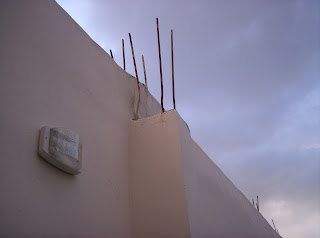
Here is a friend in Nablus finding the right price for a satellite dish.

This young woman architect uses Autodesk 3ds Max, hacked of course.

The designs look nice, and it can be said that the execution of the designs will be too; the quality of building in the West Bank is very good.

The option to add another level to the building is often kept open.

One innovation is prepaid utilities, one simply buys a card the way one buys minutes for a phone.

The Nokia model top left probably represents the majority of phones in the West Bank.

Youth everywhere waste their lives playing Need For Speed.

This Italian machine is used to make sweets.
Hard candies are made the old way in the old town of Nablus. The sound of all those drums of hard candies turning is very, very loud.
One key feature of Palestinian technology is the independence from the unreliable utility grid.

They use the same gas stoves pretty common all over much of the world; it's just attached a reusable gas drum by a hose.

The same gas drums are used to power space heaters, and can be used to power generators. The idea of gas lines running through the walls makes Palestinians uncomfortable.

Next to the satellite dishes are always water drums. At times, the Israeli army has fired at these.
 As in some of the most-advanced European countries, water is often just efficiently heated on-demand during the last stage of its travel to the shower. This means that there is no hot water from sinks.
As in some of the most-advanced European countries, water is often just efficiently heated on-demand during the last stage of its travel to the shower. This means that there is no hot water from sinks.
 In Ramallah there are software and telecom companies. Mobile telecom really dominates the local technology industry, and it is easy to see why. Mobile phones are a great thing for people who cannot rely on anything from the world but their family and friends. That said, during open conflict, the Israeli army does shut down the
In Ramallah there are software and telecom companies. Mobile telecom really dominates the local technology industry, and it is easy to see why. Mobile phones are a great thing for people who cannot rely on anything from the world but their family and friends. That said, during open conflict, the Israeli army does shut down thetelecom network, but Israeli phones must still work in the West Bank, or otherwise the settlers would have a problem too.

More than one Palestinian suggested the idea of internet for computers over the mobile network. The land network is overpriced and unreliable. The bottleneck to internet penetration is not computers; there are many nice computers that are not regularily connected to the internet.

On the other end of the spectrum, one of the main Christian industries in Bethlehem is the carving of olivewood to make sculptures for pilgrims to the Church of the Nativity. Business is not doing well.

In Jenin refugee camp there is this charming mobile phone shop.

The selection actually looks quite good.

Searching Google News for [jenin], the top article, http://www.nytimes.com/2009/03/26/world/middleeast/26jenin.html?fta=y, actually mentioned the student who was there. The photograph in the article is actually of another girl, but her name is the one in the caption. They went from Jenin to Holon in Israel to play violin for a group of Holocaust survivors.

Gmail works!

Google Maps looks good, but the results for businesses in Jenin are actually ridiculously wrong in this case.
Google Maps also does not show where the wall actually is (though it is visible in satellite view) and where the internal checkpoints are, so it is difficult to use it to plan routes or times.

Chrome fails to run after installation, so IE6 on hacked XP with no SP2 will remain the platform of choice.

There are even iPhones, needless to say not using AT&T.

Jawwal, the main mobile carrier, is everywhere, and is probably also the largest advertiser. "Jawwal" means "mobile" and is also the main word for "mobile phone" in the West Bank, unlike among Palestinians in Jordan, who simply say "mobile".
This spirited old man cannot stop talking in his mobile phone. Waiting in the shared taxi before it left Nablus for Jenin,
 he recited from heart in perfect British English the story of the country mouse and the city mouse. Some Arabic was needed to tell the story of his son, who lives in Germany and is married to a German.
he recited from heart in perfect British English the story of the country mouse and the city mouse. Some Arabic was needed to tell the story of his son, who lives in Germany and is married to a German.
Keine Kommentare:
Kommentar veröffentlichen